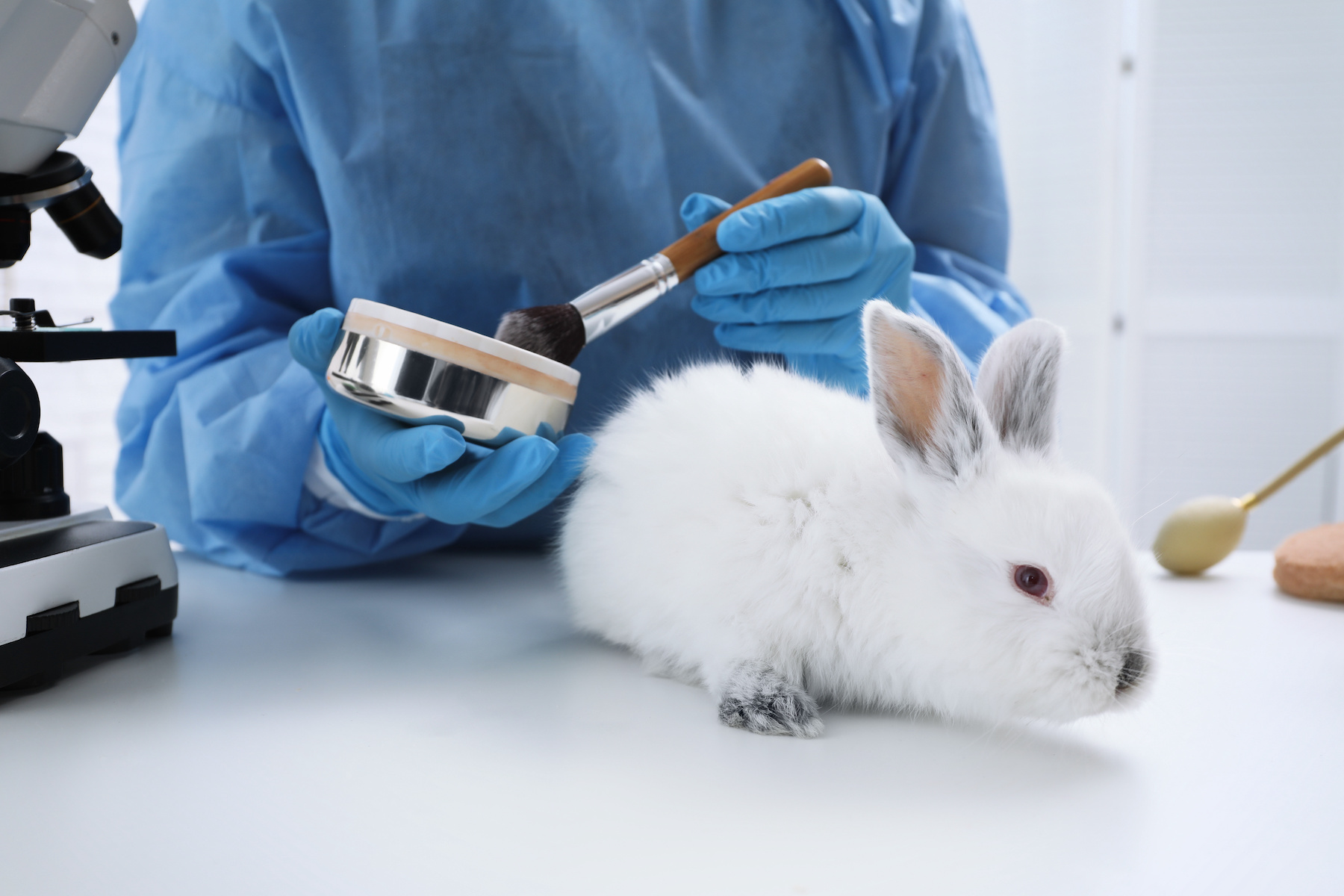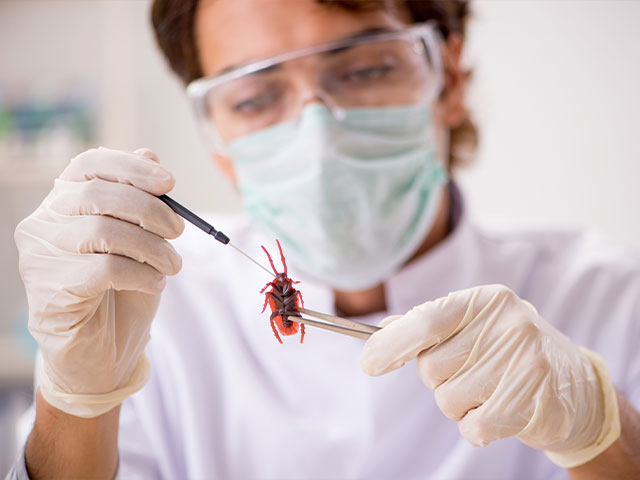Academic Programs
CAFS academic programs prepares students to learn firsthand all aspects of agriculture and the many facets which the study of agriculture and food science encompasses.
For Students
We empower brilliant, energetic thinkers who are motivated to change the world.
Undergraduate Programs
The CAFS offers undergraduate majors in agribusiness, animal science industry, biological system engineering, entomology, food science, plant and soil science, pre-veterinary animal science, veterinary animal technology, and pre-professional studies.
The Agribusiness Program in the College of Agriculture and Food Sciences at Florida A&M University is an applied program integrating the principles of economics, business and management to the agricultural sector.
The general degree in Agricultural Sciences is a flexible degree that offers students the opportunity to obtain instruction in all aspects of the agricultural sciences at FAMU and select areas of concentrations that best fits their goals.
The Animal Science Industry track prepares students for careers in the animal industry. These career paths may include animal production and management, animal feed, and animal health industries, as well as education and service organizations.
The Pre-Veterinary Science track in the Animal Science major is designed to prepare students for entry into a Doctor of Veterinary Medicine program. Besides taking all the required science courses for Veterinary College, students are also exposed to an animal science curriculum that covers the principles of beef, goat, poultry, sheep, and swine production.
Biological System Engineering (BSE) is a branch of engineering which integrates agricultural, biological, chemical, and engineering sciences.
The Entomology (Insect Science) Program provides students with scientific knowledge of insects and their interactions with people and the environment. Students receive mentorship and opportunities for experiential learning during their studies.
This multidisciplinary degree program applies the basic sciences such as chemistry, biology, physics, and engineering to improve the quality, safety, and nutrition of food. Students receive training in areas such as food chemistry, food safety, nutrition, food processing and product development in a supportive environment with mentorship and many opportunities for experiential learning.
The Plant and Soil Science major prepares students to feed the world through careers in crop production plant sciences, as well as soil and natural resource management. Students in this major receive cutting edge training in many fields including soils, biotechnology, and GIS.
As one of only 23 in the nation that offers a four-year degree in the area of veterinary technology, FAMU’s Vet Tech program stands alone in placing emphasis on regulatory education and training that prepares students to pursue a multitude of careers in the veterinary field.
Graduate Programs
The CAFS offers graduate majors in agribusiness, entomology (MS. and Ph.d.), plant science, soil and water, and pre-professional studies.
Resources for Current Students
Major Changes - Students may transfer from one department to another or from one school to another with the written approval of the department chairs and deans concerned. If a student intends to change his/her major within his present School/College or to a different School/College, he must first meet with his current advisor and complete a change of Major Form, then meet with an advisor in the department of his/her intended major. If accepted by the new College/School, the new Dean or his designee will complete the Change of Major form. The designated Major Change representative in the academic area will complete the process in the system. If the student has not been accepted into the new department by registration time, the student must seek advisement from his/her current faculty advisor.
Major and Minor Fields of Study - Every student fulfilling the requirements for a degree from the university is required to earn a “major.” The major must meet the approval of the department in which it is earned. Students seeking double majors must meet the requirements of both departments. Courses to be counted for the minor must be approved by the division chairperson and the dean of the school.
Double Major - Students are permitted to declare double majors by obtaining a memorandum from the second major department signed by the department chair indicating that the student has been accepted in the program. Students must satisfy requirement for graduation in each major in order to receive degrees in both majors. See requirement for double major elsewhere in this publication.
Academic Load - Some colleges/schools have a maximum or minimum load which is stated in the respective curriculum sections of this catalog. The normal load for a student is 15-18 credit hours.
Academic Status - For the Fall and Spring Terms, undergraduate students are considered full-time if they are enrolled for 12 hours or more. For the Fall and Spring Terms, graduate students are considered full-time if they are enrolled for 9 hours or more. During the Summer Term, undergraduate students are considered full-time if enrolled for 9 hours or more; graduate students are considered full-time if enrolled for 6 hours or more.
For more information, click here.
A Transient student is a currently enrolled student who registers for course(s) at another institution temporarily. There are two types of transient students – outgoing and incoming.
Outgoing: An Outgoing Transient student is a currently enrolled FAMU student who registers for course(s) at another institution for one term with the intention of applying the credit toward his/her degree program. Transient students must receive approval from their academic advisors before taking a course at any other institution. Completing and submitting an approved transient form lets the other college or university know that you are a degree-seeking student at FAMU. It also helps you decide, along with your adviser, what courses you can take that will be accepted and applied toward your degree program.
Incoming: An Incoming Transient student is a student currently enrolled at another institution who wishes to register for course(s) at Florida A&M University for one term. Incoming Transient students should receive approval from their home institution before registering for a course at Florida A&M University.
Outgoing and Incoming transient students as defined above from any Florida Public Institution (State University System (SUS) and Florida College System (FCS)) can begin their request for approval online at www.flvc.org (Florida Virtual Campus site) for all Florida Public Institutions. If you are applying to attend a non-Florida Public or Private institution, please click here for a form.
To complete your Transient Student Admission Application
You MUST:
- See your advisor prior to submitting your application through the Florida Shines Website.
- Be in good standing at FAMU (overall GPA at least 2.00; no Judicial Hold or outstanding Financial Obligation)
- Be enrolled in a degree program and eligible to re-enroll.
- Have a Student Health form on file indicating the required Measles and Rubella immunities.
- Know your residency classification (Florida, Non-Florida, Resident Alien, or Documented Alien)
- Know the prefix, course number, hours, course title, and FAMU course equivalent when selecting a course to take from another institution.
EXCUSED ABSENCE POLICY

PURPOSE
To help ensure students are informed regarding requirements for submission and approval
when seeking a valid excuse for class absence(s).
AUTHORITY
University Catalog - Class Attendance Regulations
University Catalog: Student Consumer Rights and Responsibilities
University Regulations: 2.013 – Due Process, Other Rights and Responsibilities
Division Student Handbooks and Policy Manuals.
DEFINITION
An excused absence is defined as written authorization/approval from the Dean’s Office
of Student Affairs for a student’s absence from an academic class/function without
penalty.
POLICY/PROCEDURE
Excused absences are issued to students in order to prevent academic repercussions
as a result of a legitimate life event. It is not designed to accommodate students
who have not behaved responsibly. Per University policy, students can be excused for
the following reasons:
(a) Illness
(b) Participation in activities, programs, and business as a University representative,
and
(c) Circumstances or emergencies that are deemed beyond the student's control.
The following procedural guidelines will be utilized in determining the appropriateness of a requested excused absence:
1. Students will notify their instructor concerning an event that may cause their
absence from class, lab, clinical, or other related classroom activity. Notice will occur as soon as the student is aware of the event. Notice should be given in person when possible and by telephone and/or e-mail, if necessary.
2. All requests for excused absences must be made within five (5) school days after a student is physically able to return to school. Requests made after this period may not be considered.
3. In order to receive an excused absence from any class or related classroom activity
(i.e. exam, quiz, or assignment) due to illness, appropriate documentation or statement
on official letterhead from a health care provider is required. This statement must be clearly dated and signed by the health care provider, or designee. However, if the illness does not require medical service, the student must provide a written request to the Office of Academic Programs as soon as possible if he/she is ill and unable to attend class(es) or related classroom activity (i.e. exam, quiz, or assignment).
4. The student requesting an excuse for participating in University related activities,
programs, or business will submit valid documentation (memo/letter/email/fax, etc.)
from the appropriate department prior to being excused for missing class.
5. Student with a valid university business excuse should submit documentation for
this event directly to the Office of Academic Programs for acceptance.
6. All requests for excused absences must be submitted directly to the Office of Academic Programs for approval. After review and if approved, the student will receive an excused absence form to
submit to appropriate instructors. A copy of this form will be placed in the student’s
folder maintained by the appropriate division.
Student Grievances Summary
Students that have both academic and non-academic issues can submit the completed form to the College of Agriculture and Food Sciences in Perry-Paige, room 204 S. This form should be submitted after the student has attempted to resolve the issue with the instructor and/or chairperson. If the student’s concern involves the department chairperson, the student can immediately submit the form to the Dean’s Office.
To obtain the form, click here PDF.
If a student believes that he/she has experienced discrimination and/or any type of harassment, they must complete a “Charge of Discrimination/Harassment” form that can be obtained from the Office of Equal Opportunity Programs located at 674 Gamble Street, (850)599-3076 or (850)599-3216.
For more information about the Equal Opportunity Programs Office, Click Here.
Application for Graduation
A student who wishes to apply for graduation is encouraged to complete the 'Student Intent to Graduate' form and take it to his/her academic advisor, at least one semester prior to the one in which the student intends to graduate. Students will complete, print/forward "Student Intent to Graduate" form to their academic advisors prior to applying for graduation via iRattler on their Student Center page. Click here to follow how to apply for graduation. Students applying for the Associate in Arts Degree should forward completed "Student Intent to Graduate" forms to the Office of Retention.
Upon receipt of the "Student Intent to Graduate" form, the academic advisor reviews student’s academic record for graduation purposes. The department’s business process for graduation reviews should be followed. If student is determined eligible to apply for graduation, the Department Coordinator with appropriate access places a Positive Service Indicator ETA (Eligible to Apply) on the student. This enables student to submit the application online via iRattler prior to or at the beginning of the term in which a student expects to complete all requirements for a degree. Deadline dates are published on the university calendar. If a student fails to graduate, he or she should consult with his/her department, division chairperson or dean and reapply for a subsequent term.
Graduation Honors
Eligibility for graduation with honors for students seeking the Bachelors/Doctor of Pharmacy degree requires the following cumulative grade point averages: 3.70-4.00-Summa Cum Laude; 3.30-3.69-Magna Cum Laude; 3.00-3.29-Cum Laude. Transfer students must earn a minimum of 45 semester hours at FAMU in order to be eligible to graduate with honors. Students receiving the masters and doctor of philosophy degrees are excluded. The cumulative grade point average on file at the time of application for graduation (usually the term prior to the term in which the student intends to graduate) will be used to determine eligibility and designate graduation honors in commencement program. However, the student’s final cumulative grade point average (usually the last term in which the student graduated) will be used to list the graduation honors on the student’s final transcript.
Graduate or Professional Degree Requirements
Specific degree requirements for the Masters, Doctor of Pharmacy, Doctor of Philosophy and Juris Doctor (JD) are listed in the applicable graduate programs. Normally, 5000 level courses or higher may be counted toward a master’s degree. Upon the recommendation of the Division Chairperson and Dean, a maximum of six semester hours of 4000 level courses may be included in the requirements for a graduate degree. Students seeking second master’s degrees must complete 18-24 graduate semester hours beyond what is required for the first master degree. Please see the School of Graduate Studies and Research section of this publication for additional information on graduate degree requirements.

















